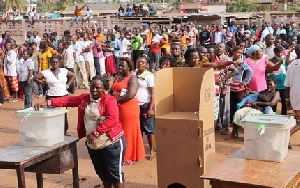The National Democratic Institute (NDI) has urged the Electoral Commission, political parties, government agencies, civil society and Eminent Persons to remain committed to steps that would enhance transparency and confidence in the electoral process.
The NDI encouraged the EC to continue with steps to enhance transparency and confidence in Ghana’s electoral process, expand and intensify its engagement with all stakeholders, and undertake more vigorous and direct public outreach with voters in urban and rural areas.
The NDI stated these in the “Ghana Election 2016 Pre-Election Assessment Mission,” which outlined a list of recommendations to enhance confidence in the electoral process and foster peaceful elections in the December Polls.
The NDI, which is a non-for-profit organisation, is dedicated to supporting and strengthening democratic institutions around the world.
It deployed an international delegation to the country from October 17 to 21, this year, to assess the preparations for the impending Elections towards supporting efforts to conduct credible and peaceful polls.
Dr Christopher Fomunyoh, a Senior Associate and Regional Director for Central and West Africa at the NDI, who presented the recommendations at a media conference, in Accra, suggested that the EC should also make a quick determination on its methodology and mechanism for the transmission of results on the Election Day.
The Institute said the modalities should be communicated to the political parties through the Inter-Party Advisory Committee (IPAC), the media, civil society and the public at large.
It should again make available to all stakeholders, its communication plans for regular, structured engagement with various stakeholders, and should increase the frequency of these encounters as December 7 approached.
Dr Fomunyoh said the delegation also recommended that the EC actively facilitate women’s participation as voters and promote gender balance in the recruitment and deployment of polling officers, and also make election-related data, such as polling station level results, available in accordance with best practices s documented by the Open Election Data Initiative on www.openelectiondata.net.
He said other recommendations required that political parties reiterated their commitment to peaceful polls as reflected in the Ada Communique of May 2016, which reactivated the Political Parties Code of Conduct that was signed in 2012.
The code hinges on commitment to credible and violence-free polls.
“Political parties should undertake effective party agent deployment plans that include training on the voting process, dispute resolution and guidelines for party poll watchers,” he said.
“They should prioritise the engagement of women, youth and other marginalised groups in these activities”.
The delegation urged political parties to provide consistent support to women candidates and prominently address their issues, while taking concrete steps to counter all forms of violence against women in politics and public office.
Dr Fomunyoh said in ensuring effective election security, the Government should protect citizens’ freedom of expression through all available platforms, including social media.
He also advised that key officials involved in the process be detailed to appropriately engage freely with the people through these platforms, while the National Commission for Civic Education and other Civil Society Organisations also intensified activities on voter education and non-violence messages.
The National Election Security Task Force (NESTF) was also urged to continue to raise citizen awareness on issues related to election security and publicise the relevant security plans in order to reassure citizens of their overall safety.
The delegation advised Civil Society Organisations to aggressively publicise their efforts to mobilise thousands of domestic observers to be deployed in all constituencies of the country, while eminent persons including religious, traditional, opinion and political leaders joined efforts to amplify and disseminate anti-violence messages, he said.
Dr Fomunyoh said the media was to strengthen its collaboration with civil society to amplify efforts to create platforms for candidates and inter-party debates and discussions of issues of national interest as well as to promote responsible, objective, and issue-oriented election reportage and desist from disseminating misinformation, inflammatory language and hate speech.
He said users of social media platforms should also demonstrate a greater sense of civic responsibility in their interactions, while the Ghana Journalists Association and the National Media Commission put in effective mechanisms to monitor unprofessional conduct and promote responsible election reportage.
He said copies of the recommendations would be disseminated among all the key stakeholders.
The delegation was composed of regional and election experts from North America and Africa, including Senator Ken Nnamani, a Former President of the Nigerian Senate and current Chairman of the 2016 Nigeria Constitutional and Electoral Reform Committee.
Others are Dr Brigalia Bam, former Chairperson of the Independent Electoral Commission of South Africa, and Dr Christopher Fomunyoh, Senior Associate and Regional Director for Central and West Africa at the NDI, and Richard L. Klein, Senior Advisor for Election for Elections, NDI.
General News of Sunday, 23 October 2016
Source: GNA

















